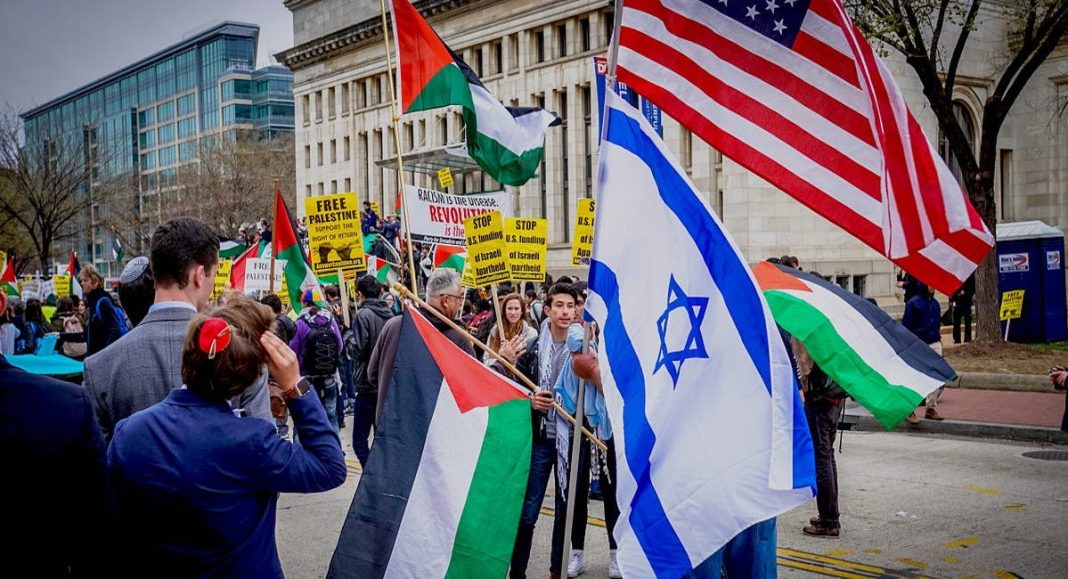Israel was declared a state in 1948 as a response to rising anti-semitism in Europe and the horrors of the Holocaust, according to the United States Office of the Historian. But modern history of Israel truly goes back some thirty years before in 1917, when the British government issued the Balfour Declaration. This declaration assured Jewish leaders that Britain would support “the establishment in Palestine of a national home for the Jewish people,” so long as “nothing shall be done which may prejudice the civil and religious rights of existing non-Jewish communities in Palestine.”
These “existing non-Jewish communities” were made up mostly of Palestinians, an indigenous Arab group that had been living in British-mandated Palestine. As Zionists, people who “believe in a Jewish right to the land of Jerusalem,” began to move into the newly established state of Israel, tensions rose between Israelis and Palestinians. The first Arab-Israeli war began in 1948 and ended with Israel as the victor in 1949. Over the course of this war, 750,000 Palestinian people were displaced from their homes, in an event that Palestinians call the Nakba, or “catastrophe.”

75 years later, Israel and Palestinians remain in conflict. The majority of Palestinians live in two territories: Gaza, a strip of land in the southwest corner of Israel, or in the West Bank, an area in east Israel. Gaza houses an estimated 2 million people, while the West Bank houses 3 million. As of 2023, Israel is the home of around 9 million people. Also, as a result of displacement, there are 5.9 million Palestinian refugees living in the Middle East. About 143,000 people of Palestinian heritage live in the U.S., with Illinois, Ohio, and New Jersey having the highest population percentages.
Although this conflict has been ongoing since 1948, tensions rose on October 7th, 2023, when Hamas militants stormed around 22 Israeli towns, killing Israeli citizens and taking hostages. Meanwhile, Hamas fired around 2,200 rockets into Israeli cities, including Tel Aviv and Jerusalem, according to Israel Defense Forces (IDF). Hamas, a militant group that the U.S. and European Union have designated as a terrorist organization, became the governing body of Gaza in 2006 via vote. According to the Council on Foreign Relations, Palestinians have not voted since 2008.
According to the Israeli government, 200 Israeli citizens and tourists to Israel were taken hostage by Hamas on October 7, and dozens were killed. On the same day as the first attacks, Israel declared war on Hamas, with President Joe Biden of the United States backing this declaration. Days later, on October 9th, Israel’s ministers called for a “complete siege” of Gaza, where Hamas militants are said to be holding hostages. Israel began cutting off water, food, and fuel to Gaza, while continuing to launch airstrikes into the territory, leaving millions displaced in a humanitarian crisis. Lisa Doughton, a senior UN humanitarian, described Gazans “living under unimaginably traumatic conditions” on October 30th at an emergency UN meeting called by the United Arab Emirates and China.
As Israel continues to expand its ground invasion into Gaza and death tolls rise, some individuals and groups view Israel’s actions as genocidal in nature, including the Center for Constitutional Rights and Jewish Voices for Peace. Others view Israel’s actions as self-defense, including President Joe Biden. Meanwhile, cities around the world have experienced an uptick in protests supporting Palestine, including Madrid, New York, and London.
Since October 9th, death tolls have risen to about 8,000 Palestinian people, according to the Gaza Health Ministry, and 1,400 Israeli people, according to the IDF. According to UN Press, at least one million Gazans have been displaced, and AP News reported that 250,000 Israelis were displaced on October 29. Moreover, as of Sunday, October 29, 4 hostages have been released to Red Cross officials, and have been confirmed safe by their families.



